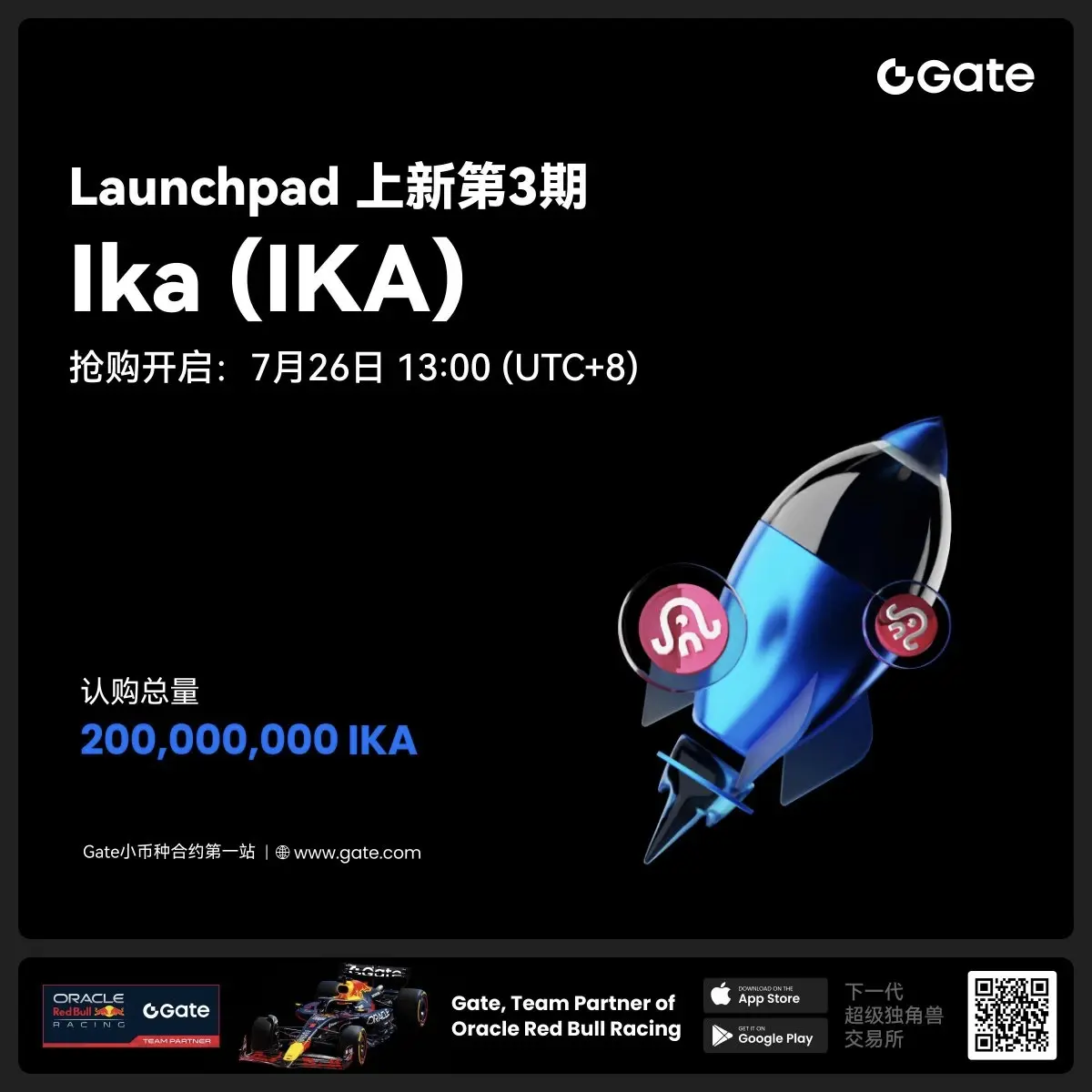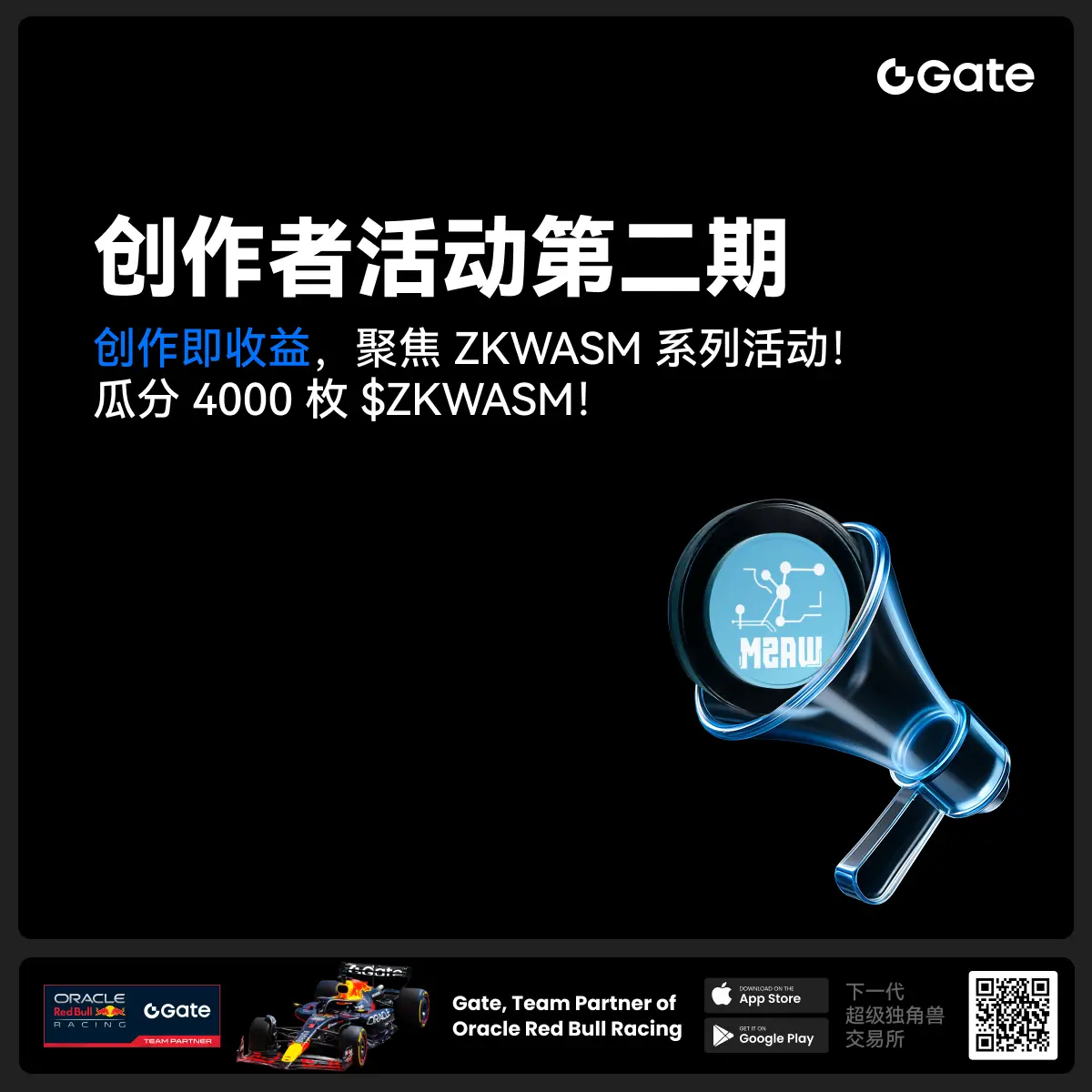- 話題1/3
13270 熱度
12345 熱度
19347 熱度
4003 熱度
14452 熱度
- 置頂
- 📢 Gate廣場 #NERO发帖挑战# 秀觀點贏大獎活動火熱開啓!
Gate NERO生態周來襲!發帖秀出NERO項目洞察和活動實用攻略,瓜分30,000NERO!
💰️ 15位優質發帖用戶 * 2,000枚NERO每人
如何參與:
1️⃣ 調研NERO項目
對NERO的基本面、社區治理、發展目標、代幣經濟模型等方面進行研究,分享你對項目的深度研究。
2️⃣ 參與並分享真實體驗
參與NERO生態周相關活動,並曬出你的參與截圖、收益圖或實用教程。可以是收益展示、簡明易懂的新手攻略、小竅門,也可以是行情點位分析,內容詳實優先。
3️⃣ 鼓勵帶新互動
如果你的帖子吸引到他人參與活動,或者有好友評論“已參與/已交易”,將大幅提升你的獲獎概率!
NERO熱門活動(帖文需附以下活動連結):
NERO Chain (NERO) 生態周:Gate 已上線 NERO 現貨交易,爲回饋平台用戶,HODLer Airdrop、Launchpool、CandyDrop、餘幣寶已上線 NERO,邀您體驗。參與攻略見公告:https://www.gate.com/announcements/article/46284
高質量帖子Tips:
教程越詳細、圖片越直觀、互動量越高,獲獎幾率越大!
市場見解獨到、真實參與經歷、有帶新互動者,評選將優先考慮。
帖子需原創,字數不少於250字,且需獲得至少3條有效互動
- 🎉 親愛的廣場小夥伴們,福利不停,精彩不斷!目前廣場上這些熱門發帖贏獎活動火熱進行中,發帖越多,獎勵越多,快來GET你的專屬好禮吧!🚀
1️⃣ #GateLaunchpad上线IKA# |IKA認購體驗
在Gate廣場帶話題曬出你的IKA Launchpad認購體驗,4位幸運分享者講瓜分$200分享獎池!
詳情 👉️ https://www.gate.com/post/status/12566958
2️⃣ #ETH冲击4800# |行情分析預測
大膽發帖預測ETH走勢,展示你的市場洞察力!10位幸運用戶將平分0.1 ETH 獎勵!
詳情 👉️ https://www.gate.com/post/status/12322403
3️⃣ #创作者活动第二期# |ZKWASM話題
在廣場或推特發布與 ZKWASM 或其交易活動相關的原創內容,瓜分4,000枚ZKWASM!
詳情 👉️ https://www.gate.com/post/status/12525794
4️⃣ #Gate广场征文活动第二期# |ERA話題
談談你對ERA的觀點/體驗,參與並推廣活動,700 ERA大獎等你贏!
詳情 👉️ https://www.gate.com/post/status/12361653
5️⃣ #MBG任务挑战# |MBG話題
分享你對MBG的洞察,積極參與和推廣MBG活動,20位小 - 親愛的廣場用戶們, #Gate 2025年中社区盛典# 投票中!🔥
🙌 廣場內容達人TOP40榜單新鮮出爐!速速圍觀榜單,爲你喜愛的達人瘋狂打call吧:
www.gate.com/activities/community-vote
每天完成【廣場】互動任務可獲得助力值,每投出30助力值即可參與抽獎一次!
iPhone 16 Pro Max 512G、金牛雕塑、潮流運動套裝、合約體驗券、熱門幣種等你抽!
助力越多,中獎機率越大,下一個抱走iPhone 16的錦鯉就是你!🧧
別猶豫,帶上你的“歐氣”,爲達人衝榜贏大獎!
https://www.gate.com/announcements/article/45974
- 🎉 Gate 廣場 IKA Launchpad 發帖活動來襲!🎉
Gate Launchpad 認購 IKA 最後24小時!曬出你的認購體驗,和大家一起分享,每個人都有機會瓜分 $200 獎池!
🎁 4位幸運分享者*$50合約體驗券每人!
🧐 如何參與:
1.在廣場發帖,帶上 #GateLaunchpad上线IKA# 標籤
2.曬出你的認購截圖 或 分享你的獨特認購小竅門/心得或趣事
3.保證帖子大於50字,內容有趣有料,原創,集齊至少3個互動(點讚/評論/轉發)
IKA認購連結:https://www.gate.com/launchpad/2336?downgarde=true
活動時間:7月28日 12:00 - 7月30日 24:00 (UTC+8)
趕快加入,分享你的精彩時刻,你就是下一個幸運兒!
- 📢 Gate廣場 #创作者活动第二期# 正式開啓!
聚焦 ZKWASM 系列活動,分享你的觀點,瓜分 4,000 枚 $ZKWASM!
ZKWASM 作爲 zk 公鏈先鋒,正在 Gate 平台重磅推廣!
三大活動聯動上線:Launchpool 認購、CandyDrop 空投、Alpha 專屬交易——不要錯過!
🎨 活動一:發布廣場貼文,贏內容獎勵
📅 時間:7月25日 22:00 - 7月29日 22:00(UTC+8)
📌 參與方式:
- 在 Gate 廣場發布與 ZKWASM 或其三大活動相關的原創內容(不少於 100 字)
- 添加標籤: #创作者活动第二期# #ZKWASM#
- 附本人參與 Launchpool/CandyDrop/Alpha 的截圖(如認購、空投或交易)
🏆 獎勵設置:
- 一等獎(1名):1000 枚 $ZKWASM
- 二等獎(2名):500 枚 $ZKWASM
- 三等獎(10名):100 枚 $ZKWASM
📋 評選標準:內容質量、互動量、項目相關性,附活動參與截圖者優先。
📢 活動二:發推贏傳播力獎勵
📌 參與方式:
- 在 X(推特)發布與 ZKWASM 或三大活動相關的原創內容(不少於 100 字)
- 添加標籤: #ZKWASM # GateSquare
- 填寫登記表 👉 https://www.gate.com/quest
FATF’s crypto checklist hints at the next regulatory crackdown
Cryptocurrency regulations are increasingly aligning with global standards; 73% of eligible jurisdictions have now passed laws to implement the Financial Action Task Force’s (FATF) Travel Rule.
The Travel Rule mandates crypto service providers to collect and share users’ transaction data, similar to traditional finance requirements. On June 26, the FATF released its annual report that outlines how recent regulatory moves by jurisdictions are converging with its global Anti-Money Laundering (AML) framework.
This is a direct result of a years-long campaign by the FATF to bring cryptocurrencies in line with traditional AML and Counter-Terrorist Financing (CFT) standards.
The FATF spotlighted stablecoins and decentralized finance (DeFi) for the second consecutive year, highlighting their rising use in illicit finance, including by North Korean actors. The organization said it plans to release targeted papers on stablecoins, offshore crypto platforms and DeFi by next summer, hinting at where global crypto regulation may head next.
The FATF’s Travel Rule was extended to cover cryptocurrencies and exchanges in 2019 as part of the organization’s standards on AML/CFT. It was added to Recommendation 15 (R.15) — one of FATF’s 40 recommendations — as an interpretive note.
Out of 138 jurisdictions, only one has achieved full compliance with R.15 in 2025. Meanwhile, 40 jurisdictions were assessed as “largely compliant,” up from 32 in 2024. Three jurisdictions were removed from the noncompliance category.
The Monetary Authority of Singapore, the city-state’s central bank, recently issued a warning to crypto exchanges engaging in regulatory arbitrage by avoiding a local license and relying solely on overseas customers. The exchanges were advised to either get licensed or exit by the end of June.
Related: Singapore’s ousted crypto firms may not find shelter elsewhere
The move sparked debate over whether Singapore truly aims to become a powerhouse for digital assets. Some in the industry speculate that Hong Kong could benefit most from its regional rival’s crackdown on unlicensed exchanges.
Chu warned that those looking for greener pastures in competing crypto hubs may end up disappointed, as all are adhering to the same FATF requirements. In fact, Singapore has issued more crypto licenses than Hong Kong.
“Regulators are also deadline fighters. So, they will make last-minute announcements (probably knowing the [FATF] draft of the report by that point) to see how they can improve their position before the formal report comes out,” Chu said.
Hong Kong has also been sprinting to roll out additional crypto rules. In May, its upcoming Stablecoin Ordinance passed the Legislative Council. The city then released an updated policy statement in tandem with FATF’s report
The FATF said an increasing number of jurisdictions have now decided how they want to regulate their respective crypto sectors, with 82% of 163 respondents stating they’ve identified their preferred regulatory approach. There are two main directions jurisdictions can take: to permit or to prohibit, with prohibitions ranging from partial to blanket bans.
Prohibition is becoming more common among Middle East and North Africa Financial Action Task Force and Eastern and Southern Africa Anti-Money Laundering Group members. However, the FATF warns that jurisdictions should consider this approach carefully, as full prohibition can be resource-intensive and difficult to enforce.
“When jurisdictions choose to prohibit rather than regulate, they do not eliminate the presence of crypto within their borders. Instead, they relinquish oversight, enforcement leverage and visibility into illicit flows,” Hedi Navazan, chief compliance officer of 1inch Labs and vice chair of the Digital Asset Task Force of the Global Coalition to Fight Financial Crime, told Cointelegraph.
“Let’s be real, crypto is borderless,” she added.
China, an FATF member, has partially prohibited cryptocurrency-related activities, such as transactions and mining. But the decentralized nature of blockchain technology still makes cryptocurrencies largely accessible to the public. Although Beijing has banned Bitcoin (BTC) mining, Chinese mining pools continue to control the majority of the network’s hashrate.
Stablecoins and DeFi under the FATF spotlight
Stablecoins and DeFi got their own sections in FATF’s report for the second consecutive year in the latest update.
Stablecoins, in particular, have been among the biggest stories in crypto in 2025 so far, with major jurisdictions advancing legislative proposals for stablecoin licensing, including the GENIUS Act in the US, which opens doors for tech firms to launch private stablecoins. The European Union has pushed further with Markets in Crypto-Assets (MiCA) Regulation, which sets rules for stablecoin issuers.
Related: Senate passes GENIUS stablecoin bill amid concerns over systemic risk
But stablecoins have also been increasingly tied to illicit activities, including reliance by North Korean actors suspected of financing the state’s weapons program, with industry estimates suggesting 63% of illicit transaction volumes were denominated in stablecoins.
Despite growing regulatory attention, most jurisdictions are still struggling to apply FATF standards to DeFi. According to the FATF’s 2025 report, nearly half of the jurisdictions that have implemented or are working on the Travel Rule say that some DeFi platforms should be licensed as VASPs, but most haven’t identified any such entities in practice.
Ignoring FATF standards can isolate an economy
The FATF’s influence is embedded within the United Nations framework, with multiple UN Security Council resolutions urging member states to implement FATF standards.
“This means jurisdictions face strong, concrete incentives to align their laws with FATF’s evolving standards, not merely out of goodwill but to avoid severe consequences,” Chu said.
Gray listing serves as a powerful enforcement tool for FATF, as it places a jurisdiction under increased monitoring, resulting in economic and reputational consequences. Budding crypto hub Dubai was formerly on the gray list before the United Arab Emirates was removed in 2024
“While FATF does not make the law, you would be foolish to ignore it. When FATF speaks, regulators around the world listen. That’s how it’s always worked,” said Navazan.
The FATF’s statements, including its annual updates on crypto, offer a preview of where global regulations are headed. With stablecoins and DeFi emerging as key areas of concern in 2025, the FATF’s planned research into these sectors is expected to shape the next wave of compliance measures.
Magazine: Secrets of crypto founders under 25 who are making bank